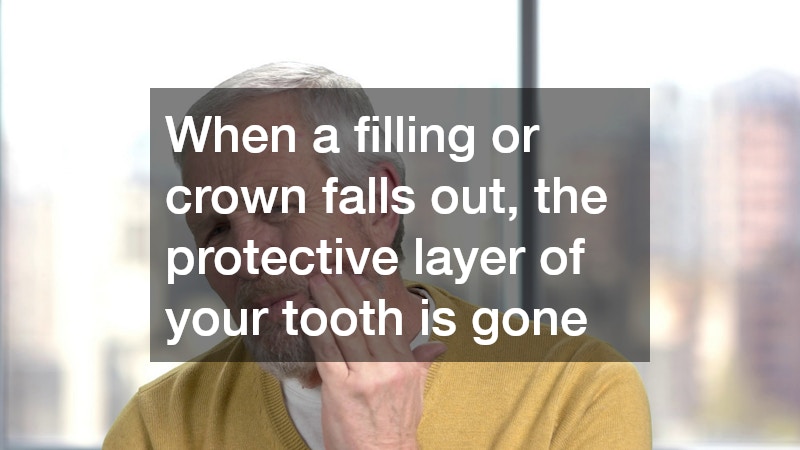The Most Common Dental Emergencies That Can’t Wait Until Tomorrow

-
Severe tooth pain, knocked-out teeth, and abscesses need urgent attention—don’t wait.
-
Same-day dental appointments stop pain fast and prevent further damage.
-
Quick first aid—saltwater rinses, cold compresses, and saving broken teeth—can save your smile.
-
Cracked teeth, lost fillings, and broken crowns must be fixed promptly to avoid infection.
-
Dental infections spread fast; early treatment is critical.
-
Prevent emergencies with checkups, mouthguards, and avoiding hard foods.
-
Know when swelling or difficulty breathing signals a true medical emergency.

Dental emergencies are never convenient. A toothache that keeps you awake at night, a crown that falls out during dinner, or sudden swelling in the gums can leave you in pain and searching for answers. Unlike routine dental checkups, emergencies require immediate care to prevent complications. The availability of same-day dental appointments makes it possible for patients to address urgent problems quickly, often saving teeth and stopping pain before it escalates into something much more serious.
Waiting until the next day may seem manageable, but in many cases the risks are significant. Infections can spread quickly, broken teeth can worsen, and bleeding that doesn’t stop could point to a deeper issue. By learning which situations require urgent care and what steps you can take while waiting for your appointment, you’ll be prepared to protect your oral and overall health.
Understanding Dental Emergencies
A true dental emergency is not the same as minor discomfort. While mild tooth sensitivity or a small chip may not require urgent care, problems that cause severe pain, uncontrolled bleeding, or visible damage should never be ignored.
Signs of a true dental emergency include:
-
Persistent, throbbing toothache that does not improve with medication.
-
A tooth that is cracked, broken, or completely knocked out.
-
Severe swelling in the gums, jaw, or face, especially if accompanied by fever.
-
Bleeding that doesn’t stop with pressure after 10–15 minutes.
-
A filling or crown that falls out and leaves the tooth exposed and painful.
Dentists often prioritize patients based on these symptoms. Clinics offering same-day dental appointments use a triage process to assess urgency. They focus first on patients experiencing uncontrollable pain, infection risk, or injuries that threaten tooth survival. This ensures that the most urgent cases receive immediate attention.
The Most Common Dental Emergencies
Severe Toothache That Doesn’t Go Away
Few things are as disruptive as a severe toothache. Unlike mild sensitivity that may come and go, a toothache that lingers and intensifies usually signals a deeper problem. Cavities that reach the nerve, abscesses forming in the gums, or cracked teeth can all create pain that becomes unbearable.
Why it matters: Toothaches often indicate infection, and infections can spread from the tooth into the jawbone or even the bloodstream. Treating the underlying cause through urgent dental care is the only long-term solution.
What you can do before your appointment:
-
Rinse with warm salt water to cleanse the area and reduce bacteria.
-
Apply a cold compress on the outside of your cheek to reduce swelling.
-
Take over-the-counter pain relievers, but never place aspirin directly on the gums.
-
Try to keep your head elevated while resting to prevent blood flow from intensifying the throbbing sensation.
Broken, Chipped, or Cracked Teeth
Accidents happen—a slip on the sidewalk, a fall during a game, or even biting into something unexpectedly hard can cause teeth to chip, crack, or break. While some chips are cosmetic, deeper fractures can expose the tooth’s inner layers and make chewing painful.
Complications of ignoring damage: Without same-day dental appointments, cracks may allow bacteria to enter, leading to infection and decay. In addition, structural weaknesses worsen over time, making the tooth harder to save.
Immediate steps before treatment:
-
Collect and store any broken fragments in milk, saline, or saliva.
-
Rinse your mouth gently with warm water to clean the area.
-
Apply gauze to control bleeding if needed.
-
Stick to soft foods and avoid chewing on the injured side.
Dentists may repair fractured teeth using bonding materials, crowns, or root canal treatment depending on the severity. Acting quickly improves the chances of a successful restoration.
Knocked-Out Tooth (Avulsed Tooth)
A tooth that has been knocked out is one of the most urgent dental emergencies. Time plays a critical role here. The longer the tooth is out of its socket, the less likely it is to survive.
Why immediate care is critical: Teeth that are reimplanted within 30 to 60 minutes have the highest survival rate. Delaying treatment often means permanent tooth loss, which can lead to further dental complications down the road.
What you should do right away:
-
Hold the tooth by the crown only—avoid touching the root.
-
Rinse it gently if dirty, but never scrub or use chemicals.
-
If possible, place the tooth back in the socket and bite gently on gauze to hold it in place.
-
If reinsertion isn’t possible, keep the tooth moist in milk, saline, or inside your cheek until you reach the dentist.
-
Get to a clinic offering same-day dental appointments immediately.
Lost or Broken Filling or Crown
When a filling or crown falls out, the protective layer of your tooth is gone. This leaves sensitive tissue exposed to temperature changes, food particles, and bacteria. Even if you’re not in pain right away, waiting too long for treatment increases the risk of further decay or infection.
What you can do temporarily:
-
Cover the exposed area with dental cement or an over-the-counter repair kit if available.
-
If nothing else is available, sugar-free gum can act as a temporary seal.
-
Avoid sticky, crunchy, or hard foods that may cause more damage.
-
Keep the crown if it’s intact, as the dentist may be able to reattach it.
Dentists handling urgent dental care often re-cement crowns, replace fillings, or provide temporary coverage until a permanent solution is ready.

Dental Abscess or Infection
A dental abscess is a pocket of pus caused by bacterial infection, often forming at the root of a tooth or in the gums. Abscesses are not only painful—they are dangerous if ignored.
Warning signs include:
-
Severe, throbbing toothache.
-
Swelling in the jaw, cheek, or face.
-
A pimple-like bump on the gums that may release pus.
-
Bad taste or odor in the mouth.
-
Fever and general fatigue.
Why it can’t wait: Infections can spread rapidly. In severe cases, they extend to the jaw, neck, or bloodstream, creating life-threatening risks. Same-day dental appointments allow for immediate treatment, which may include draining the abscess, prescribing antibiotics, or performing a root canal or extraction.
At-home care until treatment:
-
Rinse with warm salt water several times a day.
-
Use cold compresses to reduce swelling.
-
Take approved pain relievers.
-
Never attempt to drain the abscess yourself—it can make the infection worse.
Excessive Bleeding in the Mouth
Bleeding in the mouth can result from injuries, gum disease, or complications after an extraction. While minor bleeding is common, heavy or continuous bleeding is a cause for concern.
What to do right away:
-
Apply firm pressure with a piece of clean gauze for 10–15 minutes.
-
Bite down gently if the bleeding follows a tooth extraction.
-
Use a cold compress on the cheek to constrict blood vessels.
-
If bleeding continues beyond 20 minutes, seek urgent dental care or go to the ER.
Soft Tissue Injuries (Cheeks, Gums, Lips, Tongue)
Cuts and lacerations to the soft tissues inside the mouth may bleed heavily. While many heal on their own, deep wounds can require stitches and carry a high risk of infection.
Steps to manage injuries until care is available:
-
Rinse with warm salt water to cleanse the wound.
-
Apply gentle pressure with gauze or a clean cloth to control bleeding.
-
Use a cold compress on the outside of the mouth to reduce swelling.
-
If bleeding doesn’t stop, seek emergency dental or medical attention.
When Dental Emergencies Overlap With Medical Emergencies
Sometimes, dental problems extend beyond oral health and become true medical crises. It’s important to know when to bypass the dentist entirely and head to the emergency room.
Go directly to the ER if you experience:
-
Swelling that spreads to the face, neck, or eyes.
-
Trouble breathing or swallowing due to swelling.
-
High fever along with dental pain and swelling.
-
Severe trauma causing broken jaws or multiple teeth knocked out.
Immediate Steps Before Reaching the Dentist
Being prepared can make a big difference in protecting your teeth and reducing pain before treatment.
At-home first aid for dental emergencies:
-
Tooth preservation: Store knocked-out teeth in milk, saline, or saliva.
-
Pain relief: Apply cold compresses and use approved over-the-counter medications.
-
Bleeding control: Maintain pressure with gauze for at least 10 minutes.
-
Oral rinses: Use warm salt water to reduce bacteria and soothe irritated tissues.
Avoid these common mistakes:
-
Do not place aspirin directly on gums, as it can burn the tissue.
-
Do not ignore swelling that interferes with breathing—it requires immediate hospital care.
-
Do not try to “tough it out” with infections, which can spread rapidly.
Prevention and Long-Term Care
Dental emergencies can be reduced with preventive care and smart habits. Routine visits help identify small issues before they become emergencies, and protective measures keep teeth safe during daily activities.
Prevention strategies include:
-
Regular checkups and professional cleanings twice a year.
-
Wearing custom mouthguards for sports or nightguards for teeth grinding.
-
Avoiding chewing on ice, hard candy, or other hard objects.
-
Not using your teeth as tools to open packages.
-
Addressing minor problems like small cavities or early cracks promptly.
Same-day dental appointments are an important safety net. They ensure that when emergencies do happen, patients have fast access to urgent care. Clinics offering this service can provide immediate relief from pain, preserve natural teeth, and stop infections before they become dangerous.
Dental emergencies are unpredictable and stressful, but they don’t have to result in long-term damage if handled quickly. Severe toothaches, knocked-out teeth, abscesses, excessive bleeding, and broken restorations should never wait until tomorrow. Acting quickly, knowing basic first aid, and seeking same-day dental appointments can mean the difference between saving a tooth and losing it.
By being prepared, practicing preventive care, and keeping the contact information of urgent dental care providers handy, you’ll be ready to face emergencies with confidence and protect both your smile and your health.
